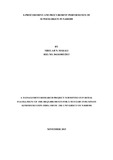| dc.description.abstract | This study explored the contribution of e-procurement to procurement performance in
supermarkets in Nairobi. The aim of the study was to assess the adoption of e-procurement
in the supermarkets in Nairobi, to evaluate procurement performance in the supermarkets in
Nairobi and to determine the contribution of e-procurement to procurement performance in
supermarkets in Nairobi. The study was informed by need to generate data on best practices
in the supermarket sector in the highly competitive and globalizing environment. From
literature, e-procurement has been hailed as one of the best practices in procurement
management.
This study was informed by the contingency theory of management and the resource based
view of strategy. The contingency theory informed this study in terms of evaluating the
adoption processes and how that aligns e-procurement practices towards stimulating
procurement performance potential in an organization. The resource based view informed this
study in terms of considered how supermarkets curve a competitive advantage based on eprocurement
practices as a key resource in procurement processes. Empirical literature
reviewed shows that e-procurement has proved advantageous in organizations across the
globe. In Kenya, most studies on e-procurement have focused on adoption modalities. This
study sought to contribute by focusing on the contribution of e-procurement to procurement
performance in supermarkets.
Due to the small number of supermarkets in Nairobi, a census survey was done. The survey
targeted 40 supermarkets drawn from Nairobi and its environs. Data was collected from the
respondents using a semi structured questionnaire. The findings in this study show that
adoption of e-procurement is still relatively low at 56% of the supermarkets and most
supermarkets adopted e-procurement practices less than a year ago. From the ratings by
respondents, the study established that the adoption process is far from optimal and a lot
needs to be done to enhance the migration of procurement functions to the e-platforms.
Further, the study established that e-procurement in supermarkets helps enhance cost
efficiency by reducing wastage e.g. use of many papers and reduced costs of sourcing for
suppliers. Considering lead times, adoption of e-procurement in supermarkets enhances
efficiency by enabling integration of departments and branches. Further, e-procurement
contributes greatly towards better communication between the different departments and
branches thus it helps ensure operational efficiency and effectiveness. The most critical
practices that contribute greatly to procurement performance in supermarkets are e-tendering,
e-requisitioning and e-sourcing.
Based on the findings the study recommends that policy makers, especially in the ICT sector,
come up with policies and programs that will enhance use of ICT in the retail industry in
Kenya. Such programs can involve, through a public-private partnership, equipping SMEs
with ICT skills for engaging in e-procurement processes. The study recommends that the
supermarkets or retail industry adopting e-procurement ought to scale down on traditional
procurement activities if the benefits of e-procurement are to be realized. Additionally, it is
recommended that organizations focus more on streamlining e-tendering, e-requisitioning and e-sourcing because a strong and significant relationship exists between those e-procurement processes and procurement performance in supermarkets. | en_US |

